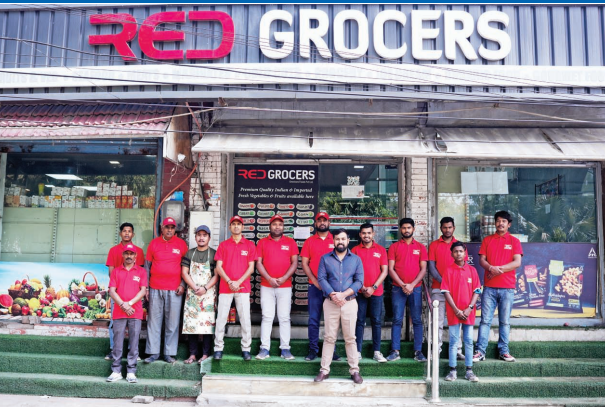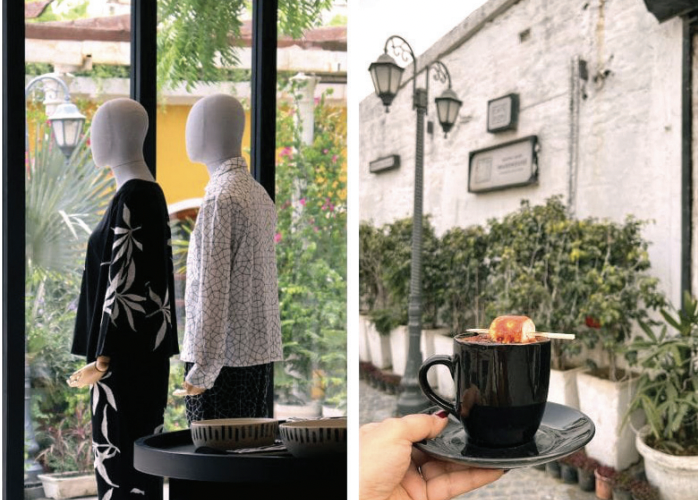Efficient delivery of just about every household item under the sky
When Ashok Sejwal (34), a native of Lado Sarai village in south Delhi, got his first job at the Khan Market outlet of Sugar ‘N Spice in 2007 for a meagre Rs 5000 a month, little could he or anyone else have imagined that one day, a few years later, he will be the owner of a veritable small scale industry through sheer hard work and grit. Because Red Grocer, a store which is synonymous with groceries and food items for Sainik Farmers and an inalienable part of the colony, is nothing short of that.
Consider this: the store, spread over 1200 square feet, stocks no less than 13,000 unique items, does an average of 300 billings a day and has a staff of almost 30 personnel, five of whom are always out to make deliveries on bikes which clock an astounding 400 kms in the process every single day! The response time for order delivery is remarkable too: make a call and within 30 minutes, the items are at your doorstep, free of cost. Besides the main store run by him, all on his own, on Western Avenue – another outlet was opened in East of Kailash and more are in the pipeline – he also operates a food processing unit and bakery in Lane W 13 spread over 2500 square feet.
Recalling his initial struggle and eventful journey which saw him emerging as a successful entrepreneur, Sejwal says he went on to join Le Marche in Saket mall in 2009 which too didn’t fetch him much over his initial remuneration package of Rs 5000 a month. “But it was a learning curve and made me determined to do something worthwhile in life,” he says. That fire in the belly led him to join as store manager in Food Basics, a grocery mart located next to Gate no. 2 in 2015, and he gained enough confidence to offer to run it by himself when its promoter wanted to call it a day.
Soon afterwards, in February 2017, exactly 7 years ago, Sejwal decided to start his own enterprise and identified the store’s current location as a suitable one. And Red Grocer was born. “We started with about 500 products, in a space of 300 square feet. Over the years, we were able to scale up the operations just due to hard work and good faith earned by serving people selflessly,” says Sejwal. Asked about the story behind the name ‘Red Grocer’, Sejwal said it wasn’t a very big mystery or anything fancy, really. “Basically, since we were storing non-vegetarian items, the ‘Red’ denoted that. And ‘Grocers’, since we were stocking basic grocery items,” he smiles, one of his endearing qualities.
It wasn’t easy to manage the finances to begin with, he says. “I often ended up borrowing money to pay off the bills and suppliers were not exactly eager to give us credit. The monthly rental is the biggest expense. Every single moment I was awake, I was trying to figure out how to keep the show going. But slowly, we gained the confidence of Sainik Farmers and their support kept us not only survive but thrive,” he said.
“Our most challenging task was to keep the show going during the COVID 19 pandemic when hundreds of residents were totally dependent on us to ensure their daily supplies. Due to travel restrictions on roads, we put up our workers in one common place in Sainik Farms itself,” Sejwal recalls. “We would take orders and put them outside the store for the residents to collect them. It was a very difficult time for everyone, but we knew people depended on us. We had to keep them fed and stocked. This kept us going,” he added.
He recalls that in the process, they even faced trouble at the hands of overzealous government officials who tried to harass him and his staff. “But this led to outrage among the residents and action against them. This kind of validation and support keeps me going,” Sejwal says. A few months back, the spirit of entrepreneurship and his burning interest in everything food inspired Sejwalto open his own bakery, called The Baking Loft, where every day fresh bread is baked (ragi bread, quinoa bread, jowar bread, millet bread). He is also making a foray into platters.
Asked if he wanted to flag any particular concern or challenges they faced, Sejwal mentioned that the parchi/toll-tax levied on vehicles by RWAs was affecting business margins adversely. “If this issue is not resolved, we’ll be forced to pass on the burden to residents by charging them delivery charges,” he lamented.



